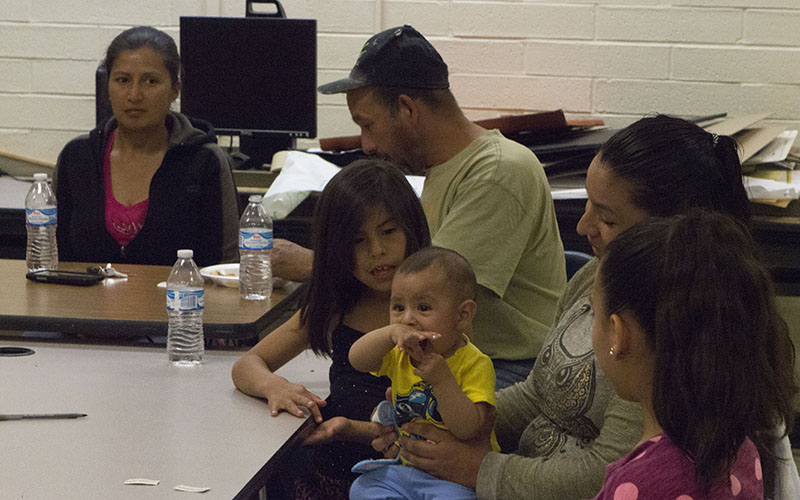TUCSON — Twice a week, Latino families gather at Apollo Middle School for Familia Adelante, an after-school prevention program designed to teach families about the consequences of substance abuse.
“We educate parents who want to learn more about how to communicate with their children” said Claudia Jasso-Stevens, director of operations for Amistades, the non-profit organization that runs the prevention program.
“We know that when we work with Latino youth, we want to engage their families if we want the change and transformation to be long-term and sustainable.”
On a recent evening, Teresa Benitez and her sons Osvaldo, 13, and Rolando, 14, joined other families at the middle school where more than 90 percent of the students are Latino.
“As parents often the first thing we do is get mad. We don’t know how to calmly ask ‘What’s going on?” said Benitez. Her youngest son was referred to the after school program because his grades were slipping, a sign he could be at risk for other problems.
Amistades targets parents and youth with a “Latino-Led, Latino-serving” approach.
All staff members are bicultural and bilingual, and aware of the complex struggles families face in their daily lives that put them at risk for substance abuse. Many of the parents are immigrants working long hours like Benitez, a native of Mexico. Many of their kids are straddling two cultures.
“There is a special population and there are special risk factors such as enculturation stress that youth are dealing with on a regular basis, and some may self-help with drugs and alcohol,” said Melissa Gomez, project coordinator for Familia Adeline.
“Enculturation stress is having to deal with two different types of cultures, a culture about where they are from, their race and ethnicity, and having to deal with the American culture.”
Substance abuse affects all communities regardless of age, race or ethnicity. Research shows that many drug and alcohol abusers begin using as a way to cope with problems, putting Latinos, especially immigrants struggling with a language barrier, loss of cultural identity, and economic insecurity, at risk.
“Latino men always have this pride of coming to this country and being productive members of society and not wanting others to judge them as being addicted or weak or anything like that,” said Dr. Saul G. Perea, Integrated Care Medical Director at Terros Health in Phoenix which provides outpatient and residential drug and alcohol treatment and mental health services.
Video by Rachael Bouley/Cronkite News
Substance abuse is still widely viewed as a weakness rather than a disease, which can discourage Latinos from seeking help said Perea.
“Like any other cultural backgrounds, sometimes we have this ingrained pride that everything needs to be taken care of in house, and we are kind of afraid to go out and look for treatment.”
Arizona is home to more than 2.1 million Latinos according to 2016 census figures and Latinos make up 31 percent of the state’s population.
Emergency room doctors see the consequences of not seeking help for addiction or substance abuse. According to the Kaiser Foundation, in 2014, there were almost 600 deaths in Arizona from opioid-related overdoses alone, and approximately 20 percent were patients of Latino descent.
“We as humans are products of the cultures around us, and the prevalence of substance abuse in the community means it’s very likely to get caught up in it. The resources available to address it are certainly not ideal,” said Dr. Mark Sexton, an emergency room doctor at Maryvale Hospital, where over 80 percent of patients list Spanish as their native language.
“A solid parenting foundation at home is extremely important. The better and more stable your home environment is, the more likely you are to avoid or recover from substance abuse.
Familia Adelante begins their after school gatherings with parents and their children sharing a meal and the chance to spend quality time together talking about their day. Then, the parents and kids separate for group sessions where they learn about the same issues but in an age-appropriate manner and at the end of the evening they come back together to reflect on what they learned.
Niza Zamudio is a “promotora,” a community liaison, for Familia Adelante who is responsible for the youth portion of the program. She uses interactive activities including games in her lesson plans to get students to think out loud about substance abuse, and how one poor decision to start using can impact the rest of their lives.
“It’s educating them on the devastating risks of substance abuse. They get to learn the consequences of making those choices and how it can really destroy their life.”
The program teaches kids to choose healthy behaviors and habits in school, at home and in the community. “I’ve learned life lessons that I can use in the outside world, like how to have safe sex, how to stay away from drugs and try not to get into trouble,” Rolando Benitez said.
His younger brother says the program has inspired him to do better in school and make good decisions for himself and his family.
“I have learned that family means everything, and connection is what matters most and that we should try our best in any subject that we can.”




